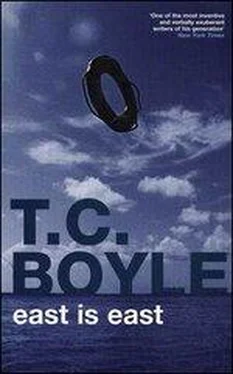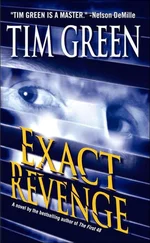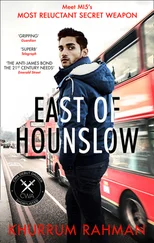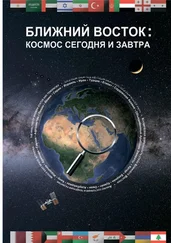Her hair—her impossible gleaming supercharged mat of flamenco dancing hair—was piled up so high on her head all Ruth could think of was the changing of the guard at Buckingham Palace. Dressed all in black—another one of those high-collared faux-Victorian things she paraded around in like a lost princess—she moved through the crowd with quiet determination, a small frown etched on her lips—oh, this was serious business, this was high drama—looking straight ahead of her, her back stiff, her steps tiny, delicate, the nibbling little mincing steps of a girl on her way to school. Flamenco siren, Victorian princess, schoolgirl: who was she kidding?
The light caught her face perfectly, exquisitely—even Ruth had to admit it. The overhead spot set her hair aflame, made a corona of it, a diadem, a glittering ball of light and highlight, while the second spot, the softer one, put a glow into her extraterrestrial eyes and lit her bee-stung lips from beneath. “Collagen treatments,” Ruth whispered to Brie, but Brie was mesmerized by the spectacle of Jane Shine, La Shine, who’d fucked her way to the top, and Brie didn’t acknowledge her. Jane bowed. Thanked Septima. Thanked the audience. Thanked Owen and Rico and Raoul Von Somebody for the lighting and audio, and then she fastened her eyes on the audience and held them, in silence, for a full thirty seconds.
And then she began, without introduction, her voice as natural and attuned to the microphone as Septima’s was not. Her voice was a caress, a whisper, something that got inside you and wouldn’t come out. The story she read was about sex, of course, but sex couched in elaborate and gothic imagery that made high art of painting one’s toenails and having a monthly period. Three lines into the story Ruth realized that this wasn’t work in progress at all—this was a story Jane had published two years ago and then polished—and repolished—for her first collection. It was finished work. Old work. Nothing from the “forthcoming” novel or the pages she’d presumably turned out here. Instead she was performing, giving them a set piece she’d read god knew how many times at the invitation of Notre Dame or Iowa or NYU. Ruth was so outraged—so pissed off, rubbed raw and just plain furious—that she nearly got up to leave. But then she couldn’t, of course. If she did, everyone would think she was, well, jealous of Jane Shine or something—and she couldn’t have them thinking that. Never. It would be like being gored out on the African veldt, vultures swooping in, hyenas laughing in the bush.
So she sat there, seething. Orlando Seezers brayed with a rich too-loud laugh when Jane’s story ran to what passed for wit, and toward the end, where the star-crossed fourteen-year-old lovers paint each other’s toenails prior to parting eternally, Mignonette Teitelbaum had to hold his hand to keep him from blubbering aloud. Jane was shameless. Not only did she pander to the audience, raving like a madwoman and repeatedly pushing a carefully coiffed strand of hair out of her face, she even did a Swedish accent as if she thought she was Meryl Streep or something (the boy was Swedish, a Nordic demigod in short pants; the girl, of course, was a Connecticut ingénue with the hair of a Catalonian shepherdess and outer-space eyes). When she was finished, there was a stunned silence, and then someone—was it Irving?—shouted “Yes!” and the applause fell on her like a landslide. Brie had tears in her eyes, and Ruth would never forgive her that. Sandy whistled and pounded his hands together till they were red, and Ruth would never forgive him either.
* * *
The reception afterward was just one of those things you had to live through. The last thing Ruth wanted was to stand around and congratulate Jane Shine, but she had no choice really. If it came right down to it she could put on a face and play the game, no problem. She loved Jane Shine. She’d been to school with her. She wished her well. Right?
If only it was that easy.
Someone put on a tape of old Motown hits—Marvin Gaye, Martha and the Vandellas, the Four Tops—and Ruth almost let the beat infect her, almost let go, until she realized that the music was for Jane, who’d made a big deal of praising it in a recent issue of Interview, a copy of which had magically come to appear on one of the end tables in the parlor. Oh, yes, Jane had practically lived Motown when she was a girl—a very young girl, of course, in kindergarten—or was it first grade? It was a beat and, she didn’t know, soul, she guessed, that made it great. She tried for the same sort of thing in her writing, not that she could ever touch “Papa’s Got a Brand New Bag” or “My Ding-a-Ling,” but there was a rawness there, a sensuality, a je ne sais quoi that she strived for. Ruth had read the article surreptitiously. It made her gag.
After the applause had died down, Ruth wandered into the party with Brie—Owen had taken the whole thing inside because of the bugs, but the French doors stood open to the patio and the sound system was still wired out there in case anyone wanted to liberate the carnal spell of Jane’s reading with a bout of groin-rubbing and hip-grinding. Ruth didn’t. She planned to remain relatively inconspicuous—a presence, yes, La Dershowitz after all, star of last night’s dramatic scene on the patío, reigning queen of the hive, impresario of the whole Hiro Tanaka adventure—a looming figure certainly, but not the cynosure. Not tonight. Brie began to bob her head to the music and then she had a drink and before Ruth could stop her she was gushing over the reading. “I’ve never heard anything like it,” she gasped, “I mean knock me down, blow me away, that’s the best story I’ve ever heard. The best reading I’ve ever heard. Anywhere. I mean it.”
Brie was goggling at her, vapid, open-faced, a little mustachio of pale sweat trembling atop her upper lip. Ruth held herself perfectly still. “Bullshit,” she snapped. “Cheap theatrics, that’s all. You call that reading? You call that sharing a work in progress? I call it grandstanding. I call it an insult.”
Brie looked stunned, lost; she didn’t know what to do with her hands.
“And the story itself”—Ruth gave her a withering look—“it’s the cheapest kind of melodrama. Fourteen-year-old Swedes, I mean give me a break.”
“Ruthie”—the tone was admonitory, two attenuated syllables, a punch on the first and a long trailing tongue-cluck on the second—“you can’t really mean that, can you?” Irving Thalamus had materialized at her elbow. He was wearing a chartreuse and yellow shirt, open at the neck to show off the black creeping jungle of his chest hair. Ruth realized with a jolt that this was the matching top to the shorts she’d pilfered for Hiro. Irving was smiling at her, his lips tight and sardonic, a smile that caught at the corners of his mouth and pricked her like a goad.
Brie began to gulp for breath as if they were treading water in the deep end of a swimming pool. “That’s what I was saying, Mr. Thalamus—”
He forestalled her with a raised palm and a tender squeeze of the elbow that managed to be both fatherly and lewd at once. “Irving,” he said, “call me Irving,” his voice rich and promiscuous.
“That’s just what I was saying, Irving”—she gave him a smile, cute, cute—“I mean I’ve heard a lot of readings at school, and in New York, and this one just blew me away, I mean knock me down with a stick, it’s like she’s possessed or something, I mean talk about acting, talk about dramatic interpretation …” Brie was so worked up she couldn’t go on. She just stood there, bare-shouldered, wide-eyed, goggling and gasping like a goldfish.
“And how do you feel about it, Ruthie?” Irving’s eyes were hooded. Somehow he’d managed to work an arm round Brie’s waist. He was really enjoying this.
Читать дальше











